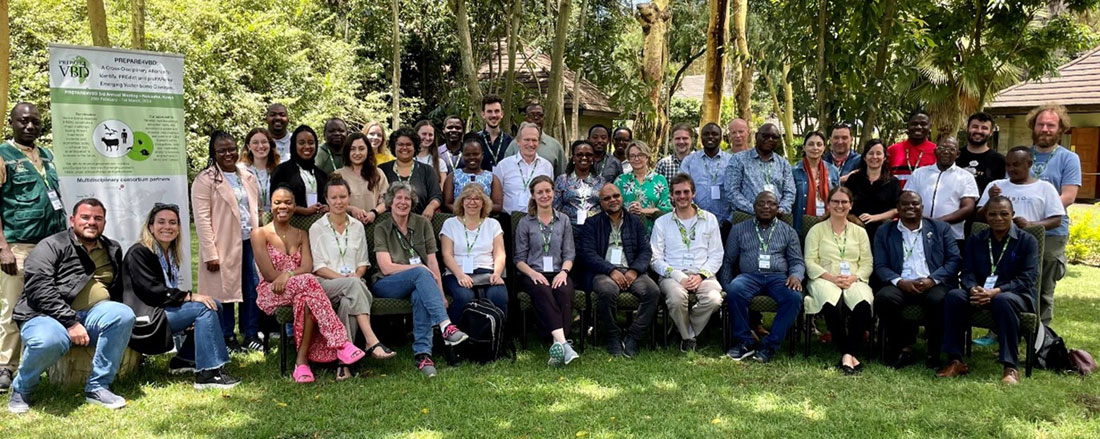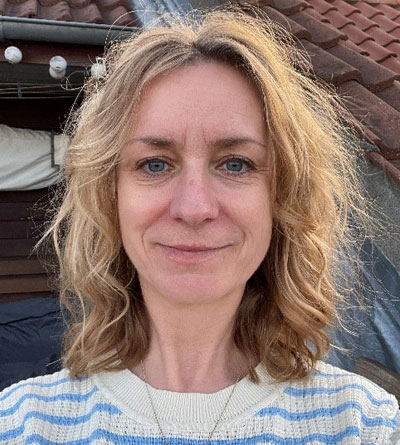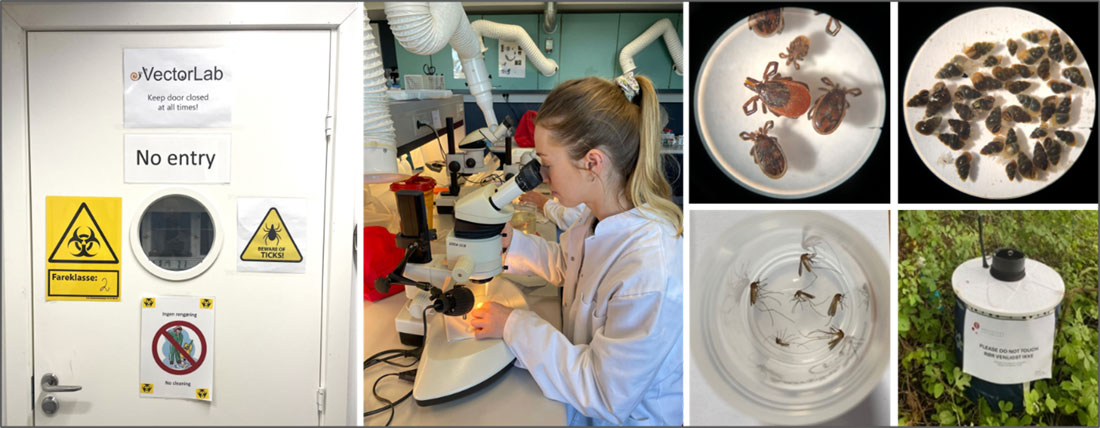Parasites, Vectors and the Environment (PARAENVI)
The group study how environmental and ecological context shape interactions between vectors, hosts and pathogens with the aim to understand how anthropogenic changes such as climate change, biodiversity loss and habitat disruption influence the emergence and risk of vector-borne, parasitic and zoonotic diseases. We apply an inter-disciplinary approach and tools such as risk modelling, laboratory-based experiments, field studies and molecular diagnostics. Our goal is to discover and promote sustainable solutions for enhanced preparedness, surveillance and control of parasitic and vector-borne diseases for the benefit of human & animal health, as well as a healthy environment.

We collaborate with a broad range of other researchers and stakeholders in global health and vector-borne disease research through national, international and cross-disciplinary projects. Current projects focus on mosquito- tick and freshwater snail borne diseases.
The group also run the VectorLab where we perform various experiments on vectors and their microbes; develop molecular diagnostic tools and training on topics such as vector identification, surveillance and control.
We are also engaged in the teaching of veterinary medicine, biology and medical students on topics such as Climate Change and Health, Human and Zoonotic Parasites, Immunology, Disease mapping and vector-parasite interactions, detection and identification.

Group Leader
Anna-Sofie Stensgaard
Associate Professor
E-Mail: asstensgaard@sund.ku.dk
building 1-05
Dyrlægevej 100, 2nd floor,
1870 Frederiksberg C
Secretariat
Kirsten Grønlund Andersen
kga@sund.ku.dk
Phone: + 45 3533 1401
Climate Change, Vectors and Vector-Borne Diseases
We combine data derived from field studies and laboratory experiments with statistical and mathematical modelling to investigate how global warming influences the distribution, behaviour, and life cycles of vectors and their microbiota, including the development and transmission of pathogens. This knowledge is crucial for predicting and mitigating the impacts of climate change and other anthropogenic changes on the spread of invasive vectors and vector-borne diseases.
Health, Disease and Control
With a One Health perspective we work to assess the disease burden of parasite infection on human and animal health with an emphasis on poverty-related mosquito- and snail-borne diseases of public health concern, such as schistosomiasis and malaria. The knowledge obtained is highly relevant for and can be translated into strategies for control.
Field- and Molecular Ecology
We integrate field studies with molecular biological methods to detect and monitor vector-borne and parasitic diseases in new ways. We develop molecular-based detection tools, such as environmental DNA (eDNA) and other diagnostic tools for rapid, on-site detection of vectors and pathogens in the environment to facilitate early detection before spillover animals or humans. We also investigate the use of citizen science-based methods to boost surveillance capacity and to increase public science engagement.
At the VectorLab we perform various experiments on snails, ticks and mosquitoes and their microbes, as well as develop and test molecular diagnostic tools for rapid detection. Recent activities include warming experiments to test the effect of increased temperature on vector snails across climatic gradients; molecular ID and eDNA-tool development for a range of Danish mosquito, tick and freshwater snail species and their pathogens.
We also train students in techniques such as vector and parasite identification, hemolymph extractions and vector collection and mapping.

PREPARE4VBD – a cross-continent alliance to identify, predict and prepare for vector-borne diseases (2021-2025). www.prepare4vbd.eu. Funded by the EU Horizon2020 Programme (PI: Anna-Sofie Stensgaard)
ARBOWATCH (2025) Funded by SEED4EU (PI: Marta Canuti, IVH-UCHP)
PreVBD - Predicting Vector-Borne Disease Epidemics: Dissemination of risk forecasting using District Health Information Software2 in Tanzania (2020-2025) Funded by DANIDA/FFU (PI: Michael Alifrangis, CMP-UCPH)
Vectorborne Diseases in a Changing World (2020-2024) (Funded by the Knud Højgaard Foundation) (PI: Mita Eva Sengupta)
The Research Platform for Disease Ecology, Health and Climate (2017-2020) Funded by the Knud Højgaard Foundation. (PI: Anna-Sofie Stensgaard)
Dual screening by Spectral Artificial Visual Examination (SAVE) for Female Genital Schistosomiasis (FGS) and cervical cancer. Digital, new, low-cost, and simple screening and training (DUALSAVE-FGS). Funded by HORIZON-HLTH-2021-DISEASE-04, European Union (2022-2026) (PI: Eyrun Kjetland, contact: Birgitte Vennervald)
Impact of increased praziquantel frequency on childhood fibrosis in persistent schistosomiasis morbidity hotspots (FibroScHot). Funded by EDCTP2, European Union (https://www.fibroschot.eu/) (2018-2022) (PI: Shona Wilson, contact: Birgitte Vennervald)
- Interview with Dr Lawrence Mugisha, University of Makerere, on the PREPARE4VBD and the importance for the actual stakeholders in the region. The interview took place during the stakeholder meeting in Entebbe (May 2025) 2025: https://youtu.be/1y1k8a92sv0?si=4my_t1kTxhq4k4Um
- PREPARE4VBD Project Holds Final Workshop in Uganda; A Landmark in Vector-Borne Disease Preparedness
The final dissemination workshop of the EU-funded project: A Cross-Disciplinary Alliance to Identify, PREdict, and PrePARe for Emerging Vector-Borne Diseases (PREPARE4VBDs) was successfully held from May 5th to 8th, 2025 at Best Western Premier Garden Hotel, Entebbe, Uganda, marking the culmination of a five-year, cross-continental research effort addressing vector-borne diseases in the era of climate change and globalization (May 2025)
https://news.mak.ac.ug/2025/05/prepare4vbd-project-holds-final-workshop-in-uganda-a-landmark-in-vector-borne-disease-preparedness/ - From NewsVision: https://www.newvision.co.ug/category/health/uganda-to-strengthen-disease-surveillance-wit-NV_210449 (May 2025)
- ”Monitoring Mosquito Populations in Copenhagen”, PREPARE4VBD blog post (Dec 2024)
- “SUND FREMTID - En fotoudstilling” UCPH-SDU (2024) on Climate Change and Vector-borne Diseases
- ”Bzzzt – tigermyggen er med på din ferie”, En Lang Historie Kort: Politiken (June 2024)
- “Parasit special!” Podcast “Den Dyriske Time” (March 2024).
- ”Klimafeber– Insekterne kommer”, BLOOM/Politikens Hus (Nov. 2023)
- ”Skal parasitter også være her?”, Podcast Vildt Naturligt, Danish Radio broadcasting P1 (March 2023)
- Project to prevent and control vector-borne diseases in Africa and Europe – University of Copenhagen PREPARE4VBD Press release (Oct 2021)
- Ny DNA-metode bringer forskere på sporet af sneglefeberparasitter, IVH-KU press release (April2019)
- Know your snails! Field guides to vector snail identification: https://ivh.ku.dk/english/research/about_parasitology_and_aquatic_diseases/paraenvi/field-guides/
Climate change could fuel urinary schistosomiasis transmission in Africa and Europe. van der Deure, T., Maes, T., Huyse, T. & Stensgaard, AS (2024) Global Change Biology. 30, 8, 12 s., e17434.
Quantitative modelling for dengue and Aedes mosquitoes in Africa: A systematic review of current approaches and future directions for Early Warning System development. LL Njotto, W Senyoni, O Cronie, M Alifrangis, AS Stensgaard (2024). PLOS Neglected Tropical Diseases 18 (11) e0012679
Environmental DNA in human and veterinary parasitology - Current applications and future prospects for monitoring and control. ME Sengupta, C Lynggaard, S Mukaratirwa, BJ Vennervald, AS Stensgaard (2022) Food and Waterborne Parasitology 29, e00183
Schistosomiasis and climate change. De Leo GA, Stensgaard AS, Sokolow SH, N'Goran EK, Chamberlin AJ, Yang GJ, Utzinger, J.The BMJ, 2020: doi: https://doi.org/10.1136/bmj.m4324
Environmental DNA for improved detection and environmental surveillance of schistosomiasis. Sengupta M.E., Hellström M., Kariuki H.C., Olsen A., Thomsen P.F., Mejer H., Willerslev E., Mwanje M.T., Madsen H., Kristensen T.K., Stensgaard A.-S., Vennervald B.J., PNAS, 116, Issue 18, 2019: doi: https://doi.org/10.1073/pnas.1815046116
Schistosomiasis. McManus DP, Dunne DW, Sacko M, Utzinger J, Vennervald BJ, Zhou XN, Nat Rev Dis Primers. 2018; 4(1):13. doi:10.1038/s41572-018-0013-8
- European Commission H2020 Research and Innovation
- SEED4EU+
- Knud Højgaards Fond
- Augustinus Fonden
- DANIDA-FFU
- European Commission EDCTP2
The PARAENVI Group
| Name | Title | Phone | |
|---|---|---|---|
| Høeg, Frederikke Juncher | Research Assistant | +4535321518 | |
| Madsen, Henry | Emeritus | ||
| Sengupta, Mita Eva | Assistant Professor | +4535331418 | |
| Stensgaard, Anna-Sofie | Associate Professor | +4535336588 | |
| Vennervald, Birgitte J | Professor | +4535331440 | |
| van der Deure, Tiem | PhD Fellow | +4535333615 |
Marie Nicole Sorivelle (Project manager)
External group members
- Lembris Njotto (External PhD-fellow, University of Dar Es Salaam)
- Godlisten Materu (External PhD Fellow, NIMR, Tanzania)
- Adriko Moses (External PhD Fellow, Vector Control Division, Ministry of Health, Uganda)
Master students
- Clarissa Josephine Seige (urban mosquito ecology and eDNA)
- Mari-Ann Evensen (Master student, monitoring of liver fluke transmission using eDNA)
- Niki Emilia Rasander Stefadouros
